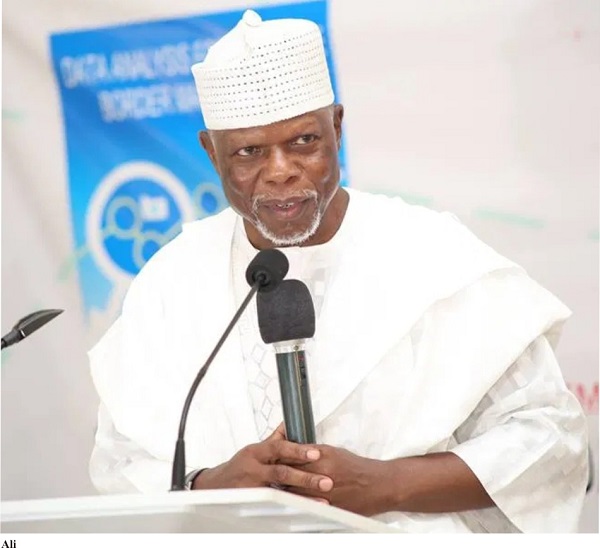
· We pay N200,000 for FOU, Strikeforce bookings – Freight Agents
· Customs sacks unbribable ACG Bashir

By Kenneth Jukpor
Five years after Col Hammed Ali (Rtd) emerged as Comptroller General of Nigeria Customs Service (NCS), maritime stakeholders are yet to see the gains of his reforms, restructuring and increased revenue, investigations have revealed.

While the Service has submitted increasing revenue figures in the last few years, economic experts assert that the increase has been as a result of persistent increase in foreign exchange rates and freight agents have also lampooned the arm twisting by Customs.

Despite Ali’s initial pledge to pragmatically tackle the chronic problems in service, especially corruption and border insecurity, port stakeholders have labeled Ali’s Customs as more corrupt than his predecessors’ with ingenuity introduced to rip off port users.
The ills of the Customs Service under Ali include multiplicity of Customs units and squads numbering over eleven. They are; Strike Force, CG Squad, Surveillance Squad, Federal Operations, Customs Police, Border Patrol team, among others which arbitrarily intercept cargoes for monetary settlements. Another menace is the issuance of frivolous alerts such as; CIU alert, APM alert, Valuation alert, Headquarters alert, CAC Compliance alert, and others also targeted at extorting freight agents and importers. MMS Plus further gathered that all these special squads report directly to the CG through his Principal Security Officer (PSO), who is a serving Brigadier-General in the Nigerian Army.
Prior to Ali’s emergence as Customs helmsman, the units of Customs were few. Border Patrol officers would hardly be found on the highways as they are today and no Command took the initiative to introduce administrative alerts known as CAC Compliance alerts.
When freight agents and importers encounter these Customs units or get alerts, the norm is to negotiate for settlements depending on the fiscal muscle of the victim, his or her influence in the cargo clearance business and the anxiety to escape demurrages and storage charges.
Analysts also attribute the obstacles being faced in the federal government’s port automation programme to the high level corruption in Customs involving some unscrupulous elements who are bent on sabotaging the efforts to attain clearance process devoid of physical contact.
In 2015, Ali stressed that the minimum jail term for corrupt officers of five years wasn’t sufficient and promised to ensure that any officer found to be corrupt gets the maximum jail term of 10 years, however, no officer has been reported to have been jailed since 2015.
Another shocking twist emerged on Friday last week, when Ali sacked highly celebrated Assistant Comptroller-General (ACG) Bashir Abubakar for allegedly ordering a raid of a prominent local rice dealer while searching for imported rice in Daura, Kaduna State.
Recall that ACG Bashir was celebrated less than two years ago for rejecting a $412,000 bribe from tramadol drug traffickers in Lagos.
Industry observers, however, have raised concerns on why Bashir’s vendetta against corruption would be celebrated in Lagos, but the same actions cost him his job in President Muhammadu Buhari’s hometown.
Bashir is regarded as one of the brightest minds in the Service and the Information Communication Technology (ICT) guru of the Service, however, his integrity and nationalism has ended his Customs career under Ali’s alleged corrupt leadership.
Speaking with MMS Plus on the misdeeds of Customs, the Coordinator of Save Nigeria Importers, Exporters and Freight Forwarders Coalition (SNIEFFC) Dr. Osita Chukwu lamented that the administration which came in to fight corruption had become more ingenious with corrupt practices.
“We are seeing all manner of things. There are over six alerts and we know the essence is just to extort freight forwarders. We have Strike Force, Federal Operations, Surveillance, alert from CIU, APM, CAC Compliance, etc. Customs has really derailed from its duty. My concern is, where do we go after this? What kind of future are we creating for the emerging generation?” he queried.
He lamented that most times Customs don’t verify before giving alerts as it was simply an avenue to get freight agents to come forward to discuss how much bribe they would be willing to pay to remove the alert.
Chukwu also revealed that Customs units such as FOU, Strikeforce, among others received bookings worth N200,000 from freight agents to prevent interception by the Customs units after the cargoes exit the ports.
“The manifest already has details of the cargo, so when it is submitted two weeks before the arrival of the vessel, Customs officers start working on it. At this point, they could decide to place an alert. You ought to be alerted based on the product you get alert, but sometimes alerts come before the vessel arrives. This has actually happened to me. I immediately went to the Customs Area Controller (CAC) to tell them that the vessel for the said alert is yet to arrive. Following the alert, the cargo owner or freight agent goes to negotiate. These are loopholes in the system. It explains why automation will not be allowed to work. Why should someone negotiate an alert?” he queried.
He noted that he had contested several alerts after retrieving the cargoes using bonds.
Meanwhile, a retired Comptroller of NCS, Mr. Anselm Nwadike told our correspondent that the ills in the Customs service were a reflection of moral decadence in the nation.
According to him, it would be foolhardy to expect Ali’s Customs which thrives on revenue targets not to go out of the way to augment their revenue.
His words: “The unfortunate thing is that the primary concern of Customs leadership is ensuring a huge amount of money is generated and announced. It’s good to talk about increasing revenue figures but can we deduce that there was an improvement in the activities of Customs? Which area did they improve?”
“There must be criteria to measure this perceived improvement. The Customs stay in their officers for people to approach to clear their goods. What effort did they make when they simply sat in their offices and people approached to pay their dues? How do you justify increased revenue when import volumes are reduced? If the exchange rate for 2019 was N200/$ and it became N400/$ in 2020, isn’t it normal to have double the revenue for 2019?” Nwadike argued.
A former President of the National Association of Government Approved Freight Forwarders (NAGAFF) Chief Eugene Nweke also posited that the corrupt tendencies in the Customs Service would continue until the government realizes that the Service was more than a revenue collecting agency.
To move away from the current corrupt tendencies, Nweke argued that the Service should have laws and regulations which represent trade facilitation agenda.
“Customs can boost the nation’s economy with revenue but it can also play a role in security issues through preventive activities. This same Customs can be used as a tool to facilitate trade if government sees Customs that way. Revenue targets should be changed to trade facilitation. That means the emphasis will be how many cargoes Customs handle at each Command per hour, daily, monthly and yearly,” he said.
According to him, if cargo volume target is introduced it would boost revenue for Customs legitimately as the Commands will be eager to clear more goods, facilitate more exports and relax their rigid and corrupt tendencies.
“What you see is a friction produced by the component of rigidity with revenue drive while trade facilitation is saying flexibility. If Customs say they aren’t corrupt, freight forwarders go about from one Customs office to another with monies, who collects these monies? He said.
Meanwhile, the President of Chartered Institute of Logistics and Transport (CILT) Nigeria, Mr. Ibrahim Jibril opined that the government’s decision to give revenue targets to Customs further exacerbates the corruption and misgivings in the Service.
According to him, the challenge of frequent interception of cargoes in transit inhibits the flow of trade and gives the nation a poor rating in the global logistics ratings.
“The tendency to celebrate the revenue that Customs generate is a problem. This trend is very worrisome and as a country we find ourselves giving the Customs revenue targets to generate income. This portends the fact that Nigeria is a dependent nation rather than a productive one which should reflect in export trade. We are content with generating revenue via importation and Customs are given targets to keep them on their toes. This has to change if Nigeria wants to become a productive nation that encourages export,” Jibril said.
On the quagmire facing Customs between trade facilitation and revenue collection, he noted that there is a need to have a balance.
“Everything we do is for the welfare of the citizens and the industry. Whatever the procedures are, as we consider driving export we should endeavour to make them seamless and efficient. Nigerians should be satisfied at the end that they have received good service. If revenue becomes a focal point and we are forgetting that we are serving Nigeria, I wouldn’t agree with this. The government agencies must realize that they are serving Nigerians; of what benefit is the revenue when it is at the detriment of the citizens? Trade facilitation and revenue generation must be aligned so that we provide services that are satisfactory to Nigerian citizens,” he added.
 MMS PLUS NG – Maritime, Aviation, Business, Oil and Gas News Online Newspaper with coverage in Maritime, Oil and Gas, Aviation, Power and Energy as well as Financial News
MMS PLUS NG – Maritime, Aviation, Business, Oil and Gas News Online Newspaper with coverage in Maritime, Oil and Gas, Aviation, Power and Energy as well as Financial News









